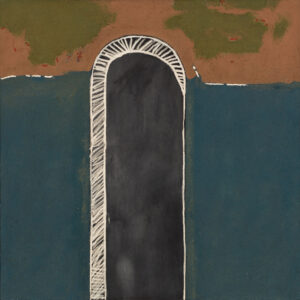
I want you to talk about your main and artistic modality, and what you see to be the symbolic and literal place you as an artist occupy, in both the western context and in your African context.
Themba Tsotsi in conversation with Mawande Ka Zenzile from South Africa
Mawande Ka Zenzile
South African artist Mawande Ka Zenzile has a seventh solo exhibition currently running at the Stevenson gallery in Johannesburg. Titled “Nqanda nanga’manzi engine ‘ndlini” (Stop the water from going into the house). The title is a Xhosa proverb about unforeseen accidents, it anchors works from Ka Zenzile’s collection that achieve combining the depth and foreground of the art works. Ka Zenzile has achieved an evolution of impact in this show. That is in this collection canvases are unified and compact in form and subject, to achieve synthesis between subject and what is represented, and what is represented and the artist. Unlike in previous works where the background and the foreground were unified by a symbolic line. In this collection works are imbued with the unified measure of a body of water.
I had the pleasure of being invited by the artist to conduct a discussion about his recent body of work. The discussion centred around the function of representation, the historic role he occupies as an artist and how he comes to choose the materials he works with. The following is the discussion, as a writer I tried to keep true to the events on the day as they happened as much as possible. The extract includes audience participation and the contribution of curator and writer Sinazo Chiya.
I just want to thank the Stevenson gallery and Mawande for this opportunity to actually talk as a writer and talk with someone who not only studied with me but influenced my thinking a lot, especially when it comes to writing about art. So, I’m just going to get into it, I’m going to ask questions that I know are on the surface with you, but they are deep with me. So, can you please explain your cultural background? Do you perceive it as a combative instrument in terms of how you want your work to be interpreted? And I am thinking about the work, “Umandlalo”, the installation that you had at Stevenson Cape Town. I want you to talk about your main and artistic modality, and what you see to be the symbolic and literal place you as an artist occupy, in both the western context and in your African context.
What a loaded question. I did not have a choice because I was born in Xhosa culture, Xhosa tradition, the locality, the centre but I exist as part of the global world. So, it’s the language that I understand, it’s my mother tongue, but art is universal. So, aesthetics are universal, it’s just that in the west they decided to name it “beauty”. But it’s something nameless, it’s like making love, you cannot really describe it. And that’s what I’m interested in, in my work, not particularly interested in just – I mean there are a lot of people who do the job of representing Xhosa people in the art world better than me, but that’s not what I’m interested in.
Just continue with that train of thought. Now, talk about your organic approach to work? How much influence does western thinking influence it? Do you feel limited by influences outside your cultural sphere?
Yeah. Again, you know, Xhosa modalities. I mean I’m also exposed to different kinds of realities. I grew up in the Eastern Cape and growing up in the Eastern Cape, there were all these sensibilities that I was exposed to and as a practising artist who has access to all these different realities, that became the centre for me to express myself. Those sensibilities are universal, they are not only central to Xhosa culture. I just wanted to share them with the world. We live in a very materialistic world that is so monolithic in a way. It cuts out everything that doesn’t belong in the dominant culture, you know. So, I’m interested in these nuances about the world we live in so that they don’t disappear. Because there’s a tension between science and the mythical reality, and I think those realities can coexist. So being exposed to European culture didn’t mean that I should assimilate. So, for me the point was to understand what it is and find a way to disenchant because we are so enchanted by it psychologically, that it kind of defines our reality. I mean, I’m educated but being educated doesn’t mean that I should assimilate, and I think for me what is much more interesting is that, one becomes able to uphold the contrasting view and that’s how I define intelligence. Not to be assimilated by the views.
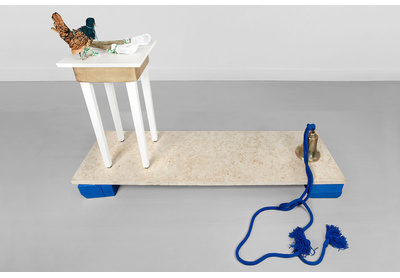
Now, do you feel pressured to balance these two worlds, to balance these paradigms?
I mean, I never belonged and I don’t feel pressure to belong anywhere and so art gives me that freedom to just play around and not be enchanted. It gives me a space to just connect with myself, it helps me to define or to separate what is the collective consciousness and myself, and I feel that’s something that the broader society needs. Otherwise, there will be no suffering. So, art allows and puts me in that space beyond affectation. It’s such a holy space, you know.
(Sinazo Chiya) I want to just talk about the thing that you both have been talking about so long, it’s like the idea of the paradigm shift and the work articulating, like, as you say, these modalities. It’s not combative, its merely shifting paradigms, and combining these worlds in a way that heals, instead of making a stick.
I mean what allows one to shift paradigm is about one being freed from the psychological trappings. It’s hard for educated people, this is what I’ve come to realise because it has been so pervasive the idea of how the world should function and what it means to be intelligent, what is reality, philosophically how we understand reality. So even if we talk about decolonisation, I realise that a lot of people are still talking about this idea within the rational point of view. They haven’t transcended the paradigm of rational thinking, it’s a psychological entrapping that one needs to liberate oneself from and then it allows you to see broader.
You’re always talking about – when we’re talking about being freed by your work and especially in a psychological sense. Now, talk about how your work connects to the collective consciousness and the collective unconscious.
I mean, it’s such a privilege to make art because it’s kind of like meditative without you sitting cross legged, it stops thinking and I think thinking – because it’s a lot of suffering, especially if it consumes you, you believe but if you are able to separate yourself from the content of thoughts, it makes it easy for you to connect with your true self, and we don’t understand thinking. That’s what I’ve realised you know. I think the majority of us, we think thinking is ours. Happy thoughts invade your mind, it changes how you feel. Negative thoughts invade your mind and it changes how you feel, but something else remains and you could tell how you’re feeling later on, and I’m interested in what stays. So, the collective consciousness is just a content of a collective content, of a psychological content of things that have been said, written about; but then, are you your thoughts? That’s what I’m interested in. Can you go beyond that? Can you push it a step further?
You also always talk about what pushes you, but that also has a language and sometimes it’s not discernible. Expand that as well because I know my issue is always why you also have works with no images, and it’s such extensive titles.
Sometimes I use a title as an entry point, but I think language also can be limiting. These are emotions that we cannot describe and I’m interested in that because that’s what happens when I’m in my space, when I’m in my studio. That I liberate myself from a sort of didactical approach to art. I think we suffer a lot from that as educated people, that the art history, historicism, historicity; it kind of limits how far we can push our creativity. But I think creativity transcends all these limitations. So, for me, that’s like my own point of entry.
Can you talk about the relationship of your work to the image of the leviathan. Now, do you feel like aspects of your modality have been devoured by philosophy or history and that through measures of myth-making that the aspects of your cultural background, also in your contemporary context, have been devoured by those schools of thought?
For the leviathan is science-ism. Finding my way to liberate myself from it. A leviathan goes back to your book, but I don’t have time to theorise now, but how society has been defined and how the idea of behaviourism from western science has been developing into an institution that it is today. It’s interesting to always go back to classical theory, classical literature which is something we are not afforded with at the university. University only teaches you secondary knowledge, you know, who says what about what, very deductive approach to thinking. So, for me, I’m interested in these epistemic tensions. How do you make sense of whatever? And so, it’s the same approach also to theory, it’s the same approach also to my art as well without appealing to authority, without feeling that you have to fit in within a paradigm…I’m high.
Stay high man. It’s cool. Now you were also telling once about the quintessential image that articulates your work is the scarecrow. Now, do institutions and social institutions, how do you articulate them in your work? Like academic institutions as well, do they fit into this image of the scarecrow? Do they define this image of the scarecrow in your work?
The scarecrow is like a scholar, but not a scholar practitioner. He’s a scholar, someone who has assimilated into the paradigm, who has no voice, who does revisionism, who has no agency, but made to believe that they have agency. But I was interested also as a motif in my own practice. The scarecrow is a kind of ambitious, ambiguous figure, it represents power, but also it is like an illusion. Like birds are afraid of it, it’s not really human, it’s not going to attack them, but it’s there and it’s guarding your garden at the same time but for me it was my own way of thinking about power. What does power mean? Does it really exist? Or is it something that we create psychologically? So that was my own way of kind of meditating around power dynamics.
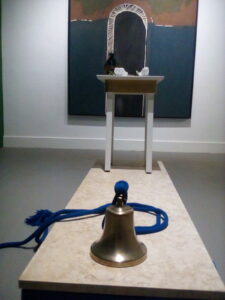
Like institutions, do they embody the scarecrow in your work? Are they living organisms or are they empty shells? Also from a social perspective, when you are inspired, how does this image…?
I mean, the idea of institutional power is such a fallacy. For me I don’t think it necessarily exists. It’s like the government, it was theorised. Okay. So, in the early 19th century, when Europe was moving from Christendom, let’s say the 17th century. From Christendom to what we have now, which is government. I mean these were theorised. I lost my train of thought, Themba. Please help me out.
Yeah, it goes back to how does the image of the leviathan as a devourer of past cultural institutions – is the advent of Christendom subjected to that image or to that silencing of violence?
Okay. So, there’s something called positivism. Not positive thinking like, oh we are all happy, it’s a theory by Auguste Comte, a French theorist who kind of defined how revolution should take place. Even the idea of revolution, if you are exposed to that kind of theory, is an illusion. It doesn’t really exist. I know there are a lot of real revolutionists out there. Anyway, he defined a new theory of social policy. It made me aware of how these institutions have been changing throughout history, how people are managed, you know. It talks about how states are created, it talks about what defines reality, a new logic is introduced which for me was an awakening moment where I realised that even the university as we understand it today has been changing. The logic of the university has been changing, but when you are in it you are made to believe that it has always been the same way throughout but it depends on the moment and the history. So, if you have known of the Vienna group, logical positivism, all that nonsense, you know. I had to liberate myself from it.
(Sinazo Chiya): Just to provoke you while you are still high, so we’ve spoken about institutionality and philosophy, and what we’ve seen between the last show and this show as well, is how the spiritual institutions that you come from have taken a more centre stage role in your practice. From you making works that are specifically centred on fallist days – I remember like early paintings that even had an echo of the fall of Rhodes – to this point now where you are making, not from concepts, not from theory where the modality is your spiritual practice. I wonder if you could speak about that, especially as someone who is educated in a particular way. And I wonder with you Themba as well, you’re a published author, you’ve also worked within, you know, or at certain kinds of institutionality; how does that affect you in terms of working from somewhere where the creativity comes from somewhere deep and perhaps unnameable.
I think I was liberated by my own spiritual journey because it taught me to let go of book knowledge. Book knowledge made it hard for me to recognise other nuances, but our reality, the mystical, the sacred because I wanted to define it logically. And so, that also translated in my work too. So, I have to move beyond just descriptive. I had to go with the emotion and leave everything that I know. And being in the journey, you know, being a shaman, it’s such a hard space to be in because you become isolated from every person, from everybody, from everything that is happening, not by choice, other entities that control you being a shaman. We call it “Itola”. It’s not like sangoma, it’s something completely different from that because you don’t go for training, but the sacred…you get the direct encounter with the sacred, you know, without the language, without the guidance. So, it demands you to completely let go of everything, leave everything, go into nature, and lose yourself there. If you’re lucky enough, your guides will come, and they will explain everything to you because you don’t have a Gobela that is going to explain anything to you. You are introduced to different sorts of things like the personal esoteric and the general esoteric about herbs, etcetera. So, it was a privilege for me to enter into that journey, to recognise that journey early on in my life, that something was happening, and it repels me from society, from social conditioning, that I’m so abnormal. I don’t know what the English word is. Even in my village, when I walk in my village, they already know this guy. It doesn’t matter what he does. He’s just himself, he’s different, he has a goat, he’s walking around with a goat. There’s a goat following him. You know, so for me, it was so easy because it’s something I recognised very early in my life, and I think for me, that’s what liberated me to be close to the sacred, you know. That plays a huge role in my own personal life and in my creative life.
Okay just to respond to what Sinazo was asking. I mean, for me working and I guess, in my understanding of western society, working allows me to have a sense of my own being. I like this image of the leviathan through Mawande’s eyes because you don’t just get a destructive element from colonialism. But even before colonialism, and even before the structures that put colonialism in place, they are also subject to that kind of violence. And this is the kind of language that I find that Mawande is striving for in his work. Yes, he’s using a Xhosa aesthetic, but then even before colonial structures were in place, the Xhosa aesthetic was there. So, it’s like a kind of conversation about history, but also like, kind of a universal realm that is kind of difficult to articulate. You know, also, being a black man who’s a writer, I find myself having to think in those parallels, and that there’s a gap dividing them. Whereas actually no, when I work, I see where the parallels connect. And then I have to write about art, because when I write about art, I see that there actually are no parallels at all. Just one singular line that I’m treading, but I need to give it meaning. Because one thing western society doesn’t give you meaning, you find your own meaning. Just in that train of thought, my mind is like, do you have a modern African philosophy? Do you feel that you have a modern African philosophy? Are the works titled in Xhosa an expression of your own spiritual understanding? Or are they reactionary to the local ethics, from the people in your background? If so, talk about how those ethics are related to the collective consciousness.
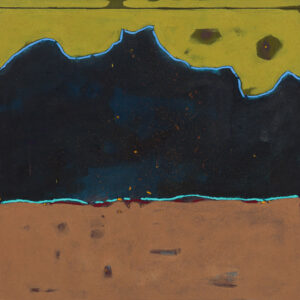
Firstly, it’s hard because I want to understand what you mean by modern. Because for me the word modern becomes cultural worldview, it’s informed by cultural worldview, it’s hard for me to define myself within those terms. Yes, there is a reality that I’m coming from, it precedes modernism, it precedes…you know what I mean. So, it continued until this day. People from the colonised have had a reality before they were colonised. They were not these naive primitive creatures who just murdered each other for fun. They were real human beings, they were loving human beings, they survived colonialism until this day and I’m celebrating that and I want to revive that. I want to put an emphasis into that, that there’s a spiritual self, part of us that has moved across time. And there’s something about indigenous communities that is so amazing. Like, it takes someone to be connected to themselves, they need to go and seek solace to these kinds of cultures. One has to travel to South America, India, you know, and the rest of them to still understand and connect with the spiritual self, that they could somehow still hold on to something that will give us wholeness. One goes to a temple and they sit there and they meet a guru and they meditate, and suddenly everything is okay. I think we need to celebrate that about our indigenous communities, about indigenous culture. We cannot let that die. I think it’s something that is very important to humanity, that otherwise, if they did not exist, I think the entire world would suffer from it, you know. So, we need to hold on to the sacred, no matter what part of the world it comes from. I think spirituality is universal, and because of science-ism and materialism, we have run away, I mean, including intellectualism. It created a distance for a lot of us from the mystical, and I think in order for us to become whole, we need to be connected with the sacred, rather than being just only rational beings who are so stressed about ideas, about conceptual ideas, I think that world liberates us from thinking, from rational thinking, that causes pain for a lot of people.
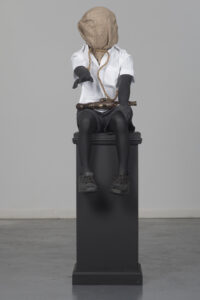
Okay, also continuing in that vein, I’m asking you now as an artist, as a practising artist. Do you feel that there’s a dialectic contradiction like in post-colonial contemporary society based on production of knowledge? And how does your work negotiate that contradiction since you have been confronted by these politics of academia and your own knowledge systems like indigenous knowledge systems.
When I enrolled for my Masters at the University of Cape Town, I was forced to experience this kind of tension, epistemic tension that the academy has been defined in a particular way. The way we create knowledge within that space is defined in a particular way. One assimilates without being aware, the enchantment becomes organic. You are not prepared to understand the space for what it is. You write in a particular way, the kind of methodological approach to thinking and writing is very one-sided and you are not given an option. The kind of deductive approach to thinking and writing is mostly used as a rule in most universities in the country, and they tell you that in order for you to theorise you need to use someone’s text and so on and so forth. So, you are not given that privilege to encounter first-hand knowledge or the possibility to define the phenomena from your own point of view. It was a very challenging space to be in. It’s really rigged in a way that you don’t even see the biasness. So pervasive that…one has to find, I don’t know hey, courage. Because you get to be supervised by someone who probably is a professor, who has been conditioned and taught to think about ideas in a particular way. And you come as a student, you never been given or there’s a qualitative approach to thinking or there’s quantitative approach to thinking. You think quantitative approach is the only approach to theorising, and I think that’s a psychological trap that you are suffering from. So, the professor, that’s the only thing they know, rational thinking, so I can’t blame them. They have a gown behind their doors, they cherish so much, they feel like there’s something to protect there. So, it was hard for me. I fired a lot of my supervisors, I said no, I can’t work with you. There was a point where I went to the Dean and I said, you know guys, you have accepted my paper, you cannot make me assimilate into this nonsense. I want to write, I want to think, I want to define the phenomena. My paper is about decolonisation and not decoloniality. I’m not interested in this intellectualism, intellectual musturbation which is a result of modernism, post-colonialism theory – it is modernism until you understand the difference. I was like, no I’m not enchanted by this. I want to describe something. So, it was very challenging to get to that space because it demanded that I had to go back and understand a lot of writings. Classical theory gives you clues, it gives you clues because the white man writes. He documents everything, he writes: oh, this is how we want the masses to be controlled. So, I had to go back, what is this idea of logic, what does it mean? Who is the father of logic? I went to Aristotle. So, in order for me to see, I had to go back in time, oh logic, what is this nonsense called logic? Everybody is logical and I realised that logic is illogical. Premise, premise, therefore conclusion – but that’s not how the world works in reality. There are other nuances. It’s not like everything is predictable. I could write, think before just objective knowledge, and for me I feel because we are so trapped in that paradigm, that it does not allow us to experience reality. I’m the expert, I’m intelligent, I’m a professor, but I have a dysfunctional life. Simple things that I don’t understand. There’re emails coming and they traumatise me and you get people who’ve never been to school who are living holistically, and I think we’ve been lied to. Especially us educated people. I think we’ve been lied to and we take our education too seriously and I think if we can transcend that, I feel we’ll get to a space of happiness.
(Sinazo Chiya): Just to trouble you a bit more, I wonder if the materials that you use is also an extension of this kind of epistemic courage that you speak about. Because when people think of painters and painting, or they think of oil or they think of acrylics, they think of linen. They think painting comes from a certain kind of lineage, but the way that you use dung, soil, the fact that there’s a tree growing in the gallery, I wonder if that material consideration is an extension of the same concept.
My name, Mawande, talks about abundance. And I think there’s an abundance of everything in this universe, aesthetics. I don’t think art could only be limited to one thing. And in my early career I was interested in the kind of combining these two aesthetics all on canvas and cow dung, which is what I grew up seeing. So, I was interested in reviving an aesthetic and pushing it further, yes, into high culture because we often mistaken high culture to kind of accepted dominant cultures but I think each and every culture all over the world has that particular side of it. So, for me, it was my way of celebrating it. It makes me think about home. I smell my work every time. If I see my work that I haven’t seen in a long time, I just go and smell it, and it can make me think about…it takes me back. I travel. I go to the moment when I was making it. I become like a baby. Like oh, I remember. Oh, this is what I was going through when I was making this work. So, it even takes me back to my innocence before I enter academia and all this stuff, nonsense. So, it keeps that reality alive for me so that every time I’m delusioned, I can just smell my work and then I can come back to my wholeness, and I wanted to share that with everybody. I wanted to share that with the world.
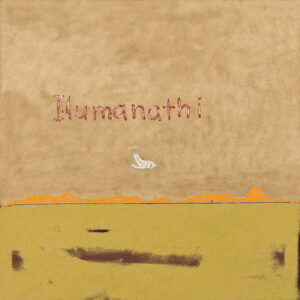
Still thinking with that train of thought, in an epistemic way, do you consider yourself a messenger of African modality though your work. Talk about the role an artist occupies as a producer of knowledge and do you see yourself as an archetype, an artistic archetype?
I don’t know about archetypes, hey! But it’s something that I’m beginning to realise through my spiritual journey, that you become a sangoma. There was someone in your bloodline that was a sangoma, you inherit their attitudes and for me, I recognised that there was something. I was supposed to be Itola, I would call it a prophet. The word prophet now is associated with churches and everything, but Amatola were the people who would advise kings, who were in front, strategists for the military. And those people are coming back now, hence we see a lot of people going to thwasa and so on and so forth. The people, my guides, the people, they were keepers of knowledge. They come from the realities of AbaThembu and it was unfortunate for me to inherit that because it meant that I’m going to lose the joy of being a child. I just became abnormal, you know, now that wisdom invades my head and other people are normal. I took on that journey because I had no choice but to keep knowledge and share it with everybody and there’s a consequence to that, but I think I can handle it more now. But whatever that I am today is because of people that lived before. That I had to find myself smoking a pipe and I didn’t even understand that dreams tell you what to do, how to live your life, it’s so exciting you know. But anyway. So there have to be people, there have to be prophets in society that will guide humanity to a certain stage of evolution in however way you want to see it. So, I translated that in my work too.
Now talk about how your work helps with coping with negative energy both in the township and in your professional academic development.
Wow, it’s exciting you know.
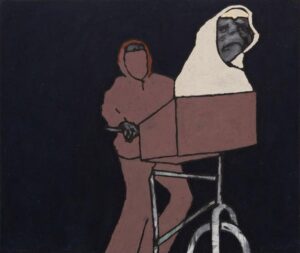
You were trying to explain it to me. How you create borders for yourself, especially when you are working and the receptions that you get.
Yes, it’s so exciting because for me when I’m making my work, I don’t feel like I’m working. It’s more like I feel like I’m playing and there’s loud music and there’s dancing. I mean in that moment I’m one with everything, so thinking is removed. There’s a point where I don’t think at all. I can’t separate myself and the canvas. I don’t think about what I should do next, it just comes. Okay, I identify. So, it becomes protective in that sense, even if I feel like…like you’ve said, all this tension, the township, academy…but it protects me, it creates a shield. When I make my work, I don’t think about anything. I’m there. I don’t think about dialectics, I don’t think about Sigmund Freud, I don’t think about all these nonsense things, I am just present with the work. Talking with the work, and it tells me “Oh, put a grey there.” And then like, “Okay, I’m going to put a grey, and then put a red there, and then I’m okay, fine, you know. So, it helped me guide me not to assimilate into these theories, or identity politics, which I felt like it made the art world, in particular South African, to be monolithic in a sense, like, you all know, all this. “Oh, there is going to be a naked body on the canvas, and it’s going to be painted black, you know. So, for me, it guides me and says, “No, leave that,” someone is good at doing that. They don’t even enter, there are experts who are great in doing that, and just stick with what is in front of you. So, for me, I’m grateful for that experience. And I feel like if we open up to the experience of art-making, and not think about the rational thinking, the ideas, the dialectical thinking, we just take a break from it and just immerse ourselves in the materials and immerse ourselves in the practise, then it can liberate us from depression from, from a lot of mind stuff, things that we believe about ourselves, you know. I’m not trying to be radical anymore about my work. I used to be like that, like, oh, I want to change the world. I was so depressed, and I’m like, really? Is this what life is about? And also, again, because my early work practice was about representation, politics of representation. But I discovered that I was not really honest to myself. I was just caught up in…but that was not my role to play because every time I go home, I go to a symposium and then now my wife has to kind of comfort me because somebody said something that I disagree with, and it made me so mad, and fuck white people, fuck white people. But everybody is a human and everybody was a baby once. I felt like, it takes the humane away from you and then the expectation of, if you are making art from Africa, you have to be talking about representation. I felt that’s not my responsibility anymore. I’m like, European artists can just do whatever they want to do. They don’t have to write about identity politics and who did what to who, and for me, that was very important. I think art can transcend all these things. You know, it’s about love. It’s about a lot of things. It’s about sensibilities, about beauty, whatever you think beauty is. So, it helped me, Themba, to be centred, it freed me from mental suffering, that I no longer suffer, I don’t go home like, “Ah, now I disagreed with someone about what I thought was racism and whatnot.” And just accept everybody and love and just go beyond just judgments that cause separation and heal everybody, and I think for me, my role as a prophet is not just to promote Xhosa culture, but to bring hope to humanity. And it’s a privilege that I have, I can’t be selfish about it because now I’m enticed by a professor of mine who writes on racial discourse. So, because I love their writing, therefore now I mould myself. I felt like one disappears. I had to find myself in the world, rather than moulding myself according to what Steve Biko thinks or what Fenon thinks. I had to move beyond that and there’s joy in that, you know, everybody today’s depressed, even fashionable to be schizophrenic today. We can’t seek help. How do we get out of this? How do we move beyond the pain, the psychological pain? We immersed ourselves in this thing we don’t understand, rather than going out and taking a break and like, oh, okay, let me take a break. Let me find help. I’ve been depressed. I don’t know why. Oh, because I felt like someone was racist or sexist, and so forth. But something triggers me. How do I win myself? How do I liberate myself from all of this? That I can exist, that I can live? So that’s what I’m interested in, Themba. Sorry, I’m high.
SC: Yeah, I enjoy how even in this show, you’ve got work called “Redemptive Love.” And that’s like, such an indication of the practice. But what I’m saying is, if anyone has a hand to raise or a question, please…Do you mind Themba?
No, it’s fine.
(Audience Member): Hello everyone, my name is Zama Ntsele and I’d like to start off by thanking you, Mawande, for presenting your work with us today. So my question is, firstly, could you speak about your title? Nqanda nanga’manzi engene’ndlini, which I find very interesting. And it actually sounds quite idiomatic.
Yes it is.
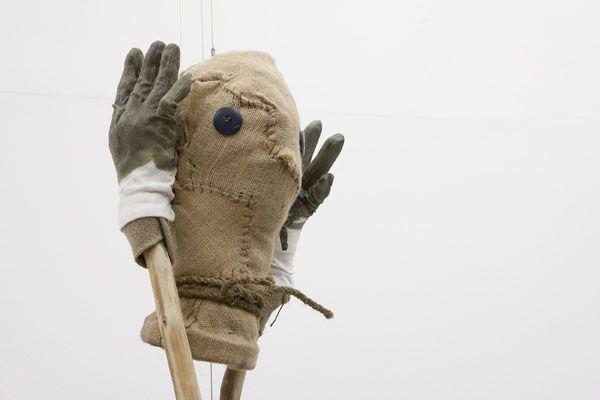
(Audience member) Yeah. And I’d love for you to speak about that. And to just expand on my experience of that title, when I walked in, I’m like, “Haibo!” Why soil in the house? You know, why is there soil inside? It’s almost as if there’s an inversion of the outside in, you know, there’s a bird’s nest, a tree, and what looks like a kist but it also looks like a coffin. I’d really love for you to speak about that inversion of the outside-inside dynamic.
I think you’ve already said a lot about it. I think I’m going to spoil the fun for you if I define it for you. Because I’m already afraid to tell people what my work is about, and what it means. But Nqanda nanga’manzi engene’ndlini is a Xhosa idiom. I don’t want to spoil the fun for you. The untouchable, the sensation, you know. One thing that I said to Sinazo while we were making the installation and finishing up, I said, I want people to cry without knowing why they’re crying. Without knowing where. And the work is not descriptive. It’s not about sad people, don’t see sad people and then now you cry, because you see sad people. There is nothing. Which is what art is about. It should be about, you know that there is something. I mean, we have this obsession in the words to describe these sensibilities as beauty, as ugliness, as whatever, but they go beyond the word. Krishna Moody said something very interesting about this, in relation to this. She said the word is not the thing. Right? The word is not the thing. And art goes beyond syntax. You know, and I’m interested in that. I don’t know if I answered your question.
(Audience member 2) Hi everyone! I found something interesting on the work. It looks like you’d used cow dung as part of the work, which I found very fascinating. And if I am correct, I’d like to find out what might have inspired that. Thank you.
Okay, so cow dung, when I was growing up, even today, it’s a material that they use in their homestead. They smear it on the floor, they use it for particular rituals. There are a lot of significance in the dung, you know, cultural significance. And for me, early in my career, I wanted to find an alternative to painting on canvas. And that’s how I get to use cow dung. I wanted to celebrate this aesthetic, something that I’ve seen growing up, rather than it dying. I had to sort of evolve it into something else. Remember, oil on Canvas, even in Europe began as frescoes, on cathedrals, on the walls, then they were there because of industrialisation, then they were transferred into the fabric. And that’s how they hold on to the aesthetic, and they were moved out of the churches into the white spaces today. So, for me, I want to celebrate that part of myself. That beauty in the dung, the sacredness in the dung, you know. I want to share with everybody and that’s the intention behind using cow dung. I don’t know if I answered you.
Okay, coming back to just the artwork, consistent with the guy’s question, is your intention to make the audience have a new encounter with the images they see? If someone sees an image from pop culture, do you expect them to read it in the same manner as the initial context?
I recognised early in my career that the role that words play in directing us and manipulating us, is also played also by images. Remember images are also useful tools for propaganda. And I was interested in taking iconographic images, not as an iconoclast, that nonsense you read at university. But I was interested in taking the image and using it in a different context from what it’s originally known to represent, but I also wanted to kind of like work with the image that is not only read as an image, and that’s what art affords us. You look at the picture, there’s a picture in front of you, but there’s also texture, it’s an object, it’s there, you decide which makes sense for you, you know. But then from that, I was also liberated, I noticed something in my work, that it doesn’t really need images anymore. I don’t need images to tell people what to think, what to see. They just have to be immersed by whatever that they don’t know and I had to celebrate that. So, my work, in a sense, spoke to me and said; no, Mawande let go now, you know. Leave these images, you don’t have to be too descriptive. You don’t have to assimilate to what everybody enjoys and they just have to leave their shoes outside and just come in. The audience sees, without them projecting anything. I realised that it’s hard to look, it’s like listening. It’s hard to listen, if you have preconceived ideas about anything, because you rob yourself from the moment, the experience because when you come to Mawande Ka Zenzile’s exhibition, you have all of your questions in your mind and you want to project those. Then the moment disappears. So, if you come in and you want to see abstract art, that’s the only thing you’re going to be thinking about, but looking and seeing, happens when the thought is removed from the previous conditioning. Then you look, then you can see. I want people to look and immerse themselves in the moment without what they know. If you come into the space with what you want to see, unfortunately, it is not my business, it’s your business, you know.
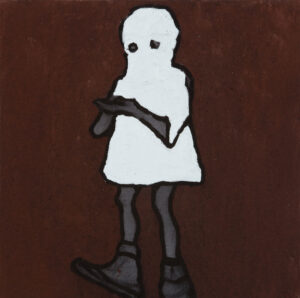
But then talk about the traditional, or the archetypal reader. I think I mentioned to you that I believe in society we are trained to read in a particular way. And that applies both for visual images and for written text. Now, talk about how and where your lens was? Where was your third eye lens when you decided, no, man, visual language is just as multi-layered? So just explain how you came up with that realisation.
I mean, I realised that at some point, I think my work liberated me when it comes to this. The moment I let go of the image in my work, it was a moment. And because the images are so descriptive, hence the archetype, but then be aware of the archetype rather than unconsciously being dictated by it. So, I think when that happened, I was like, I know what is expected from me, everything is predictable. Being radical is also predictable because it’s an archetype, it’s created by someone, and it’s a role that you play and you think you’re being radical, but someone else has defined that role for you. So, I think my work has liberated me to look from the outside. I’m like, oh, okay, so this is what is happening. And then, I mean, it was just liberating. It’s such a lonely road, but it’s beautiful. I’m happy. I’m growing, you know. Yeah.
Now talk about this idea of debunking visualities. Is it related to how we read? Is it related to how you are supposed to connect with images and text? Yeah, what’s the idea of debunking visualities?
My presentation was about decolonising visuality. And I was thinking about decolonising visuality right at the beginning, before it became about this epistemological discourse, because I was interested in talking about images, visualities, after I noticed that there is a particular approach that is as expected from art from Africa. So, I didn’t want to belong. I felt like I was looking for more. I needed to go back into the source and just dig there and find things, but I realised to get there, it was hard because I was educated. I had a way of perceiving things. So, I needed to unlearn whatever that I knew so that I can access what is already there, been there for centuries, you know. So hence decolonising visualities. But how it turned out now decolonising visualities, I had to understand the other, my limitations because my limitations are created by the other, you know, the paradigm. So firstly, I needed to liberate myself from the paradigm. Funnily enough, there was a movie that I watched, a sci-fi movie. Star Trek. I don’t know if anyone knows Star Trek. And it created a very interesting image for me. And I love to share this. In Star Trek, the two are two series that I watched that nuance the problem we are facing today. Hence the problem we didn’t create. It’s about a group of people. Natives living the primitive life in a village, a beautiful village. But what happened, the enterprise was there. So, the enterprise lives in this hologram, which is hidden from the villages. So, they’re the only people who can see the villagers, but the villagers can’t see the enterprise people. So, they’re studying all these native people and moving around in daily life, and so on and so forth. But there was another alien species who were called the Son’a and the Son’a were also more advanced, because the land had minerals and everything, they wanted to dig the land. So they took, and created a hollow ship, which is a replica of the village of the local people, the Ba’ku. So, the Ba’ku were going to be removed in their sleep, they took them and they put them on the hollow ship and the hollow sheep, which looks exactly like a replica of the village until the plot was exposed. And I feel this is how today functions as well, that there’s a hollow ship we believe is our reality. But there’s a reality beyond that hollow ship. Yes, the village is still there, but there’s someone that’s looking from outside and we don’t see who’s pulling the strings. So that was an awakening moment like, Oh, shit. These sci-fi movies have a lot of parables, nuanced messages about the reality we live in today.
Okay, I mean, I remember you gave me the homework to watch that episode. I saw that episode. I think what Mawande is talking about is, in postmodernism, they talk about this idea of the simulacra. You know, like, an image, that is a copy of an image, but it doesn’t function like a copy, it functions as the original, but we all know that the original exists, and people tend to follow the copy. It’s like an epistemic scarecrow. It sounds romantic, but it actually leads to the kind of conversations we have, like how we read society. We also become these kinds of hollows, this kind of epistemic scarecrows.
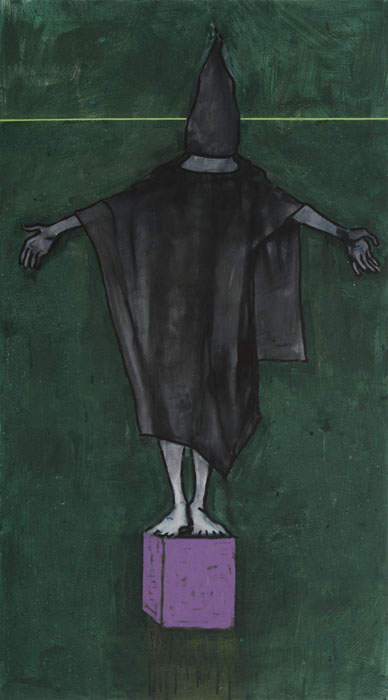
Sorry Themba to cut you, but the psychological entrapping, I recognise that it’s hard to get rid of, because somehow, you believe it’s you. It’s like you immense yourself, like when you said, you kind of like the feeling. At the same time, you want to get rid of it, but at the same time, you love it. There’s a part of you that enjoys this and I feel like, hence it’s so hard for one to liberate oneself, because there’s already a reality that you’ve identified with and to detach yourself from that reality, it takes a lot of psychological gut. Because you feel that’s your responsibility to call out people. Oh, you’re being like this, you’re being like that, you’ve been like this, you know. While at the same time when you go home it eats you it eats you. My wish is to at least free myself and hopefully share that with everybody who is willing. You cannot force someone out of their psychological entrapping. It’s their choice, a personal choice, you know.
Okay, Mawande, this is my last question for you for the session. Just talk about, please, how your work is perceived internationally? Just from your perspective? I mean, do you also have similar anxieties here where your spiritual background is questioned or your ability? Because I’ve heard of situations where artists question how they did this? Or why did they find the ability to do this kind of work? And they talked about the international reception. Please talk about that more. That’s my last question.
Thank you Themba, it’s an amazing question. In 2019, I was in a residency program at the SITE Institute in Paris. But what I found interesting about Europe, and in particular France, French people, I was walking in the street. I found an esoteric bookshop in the street. And I was walking with my wife, also, I found a herbal shop that had herbs that I know and as someone who has dealt with the herbs here in South Africa. Just in the street, you know, I’m like, “no, ngumlomo o mnandi lona,” you know. So, it was easy for me and I was so shocked. Like, oh, so we’ve been lied to. We’ve been lied to a lot, you know. Indigenous knowledge is celebrated in Europe, hence, it’s easy for me to practice outside. There’s a tension here in the country. A lot has been so esoteric, a lot have been looked down upon. So, I mean, because of the history that we’re coming from, apartheid and all that nonsense, a lot of things have been hidden. There are anxieties, we can’t really push the fabric, we can’t really push the card. We are limited to politics of representation, but we can’t go further than that. But Europe for me was shocking. I was like, what? Esoteric bookstore in the middle of the street? So, you have a choice to know stuff, just beyond academic knowing, and like wow, I would kind of imagine that in the middle of Cape Town or in the township where people can just go into this bookshop and they can learn things that can help them to change their life. Because we take this for granted, we are only given this academic knowing that makes us depressed, but something that could awaken us and like, Oh, there’s more to this. There’s nothing wrong in holding two contrasting views. Even if I’m an artist, I can also be a businessman. And so, how do I handle this? How do I handle this? Okay, so, there is a mystical side. Okay. So, these people, they go to India, Himalaya and meditate, okay, so it makes sense. You know, now you can handle power, you can handle…so it’s interesting, man.
(Sinazo Chiya): We’re going to stop there. Thank you so much Mawande. Thank you so much Themba. One of my favourite works in the show is called Listening to distant thunder. And Mawande has really made works that sit in a way that you get immersed in a feeling. You don’t need a concept or language to lean on. And it’s such an amazing thing to give all of us. So yeah, thank you, Themba and thank you Mawande, enjoy the show.
